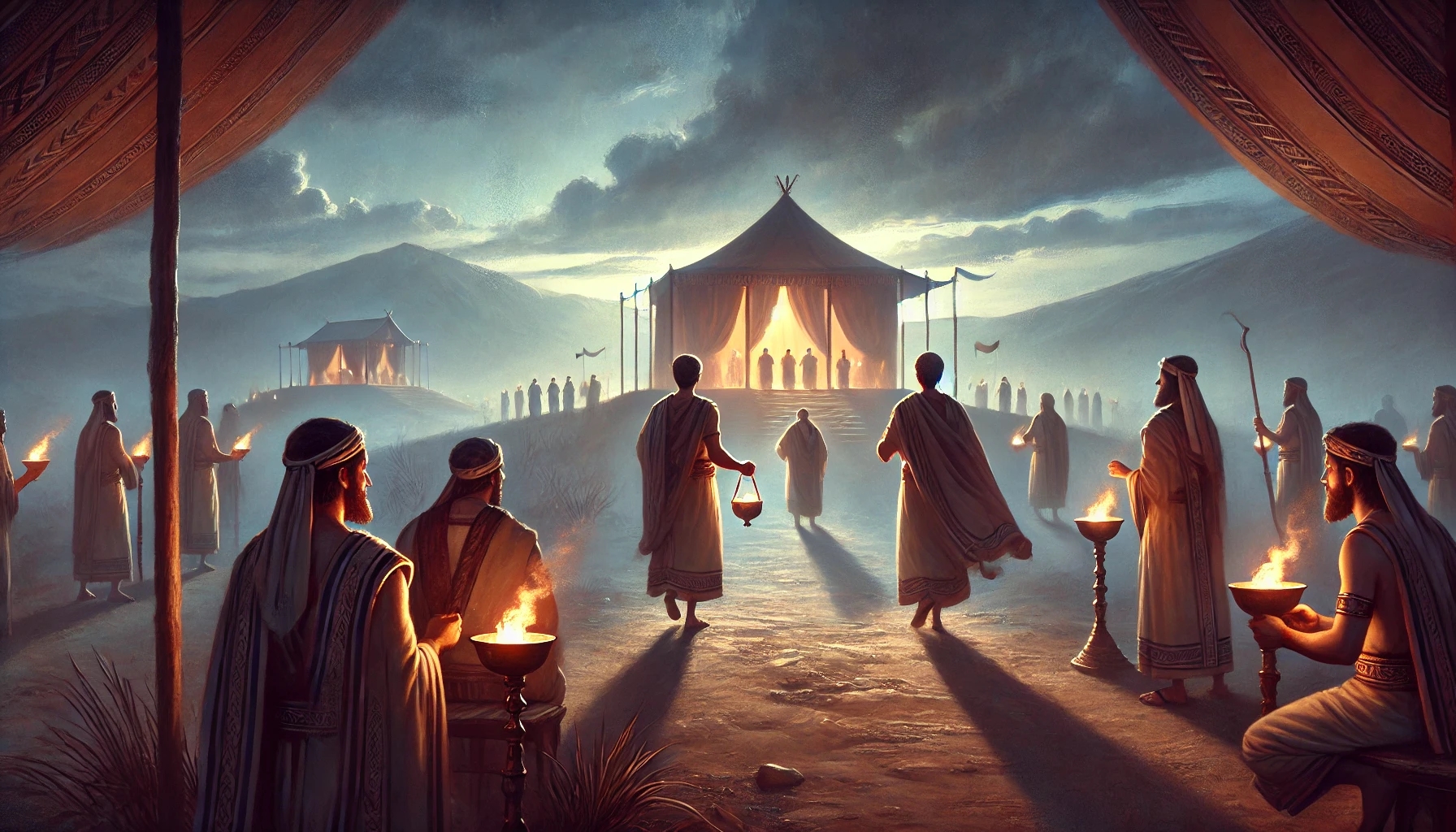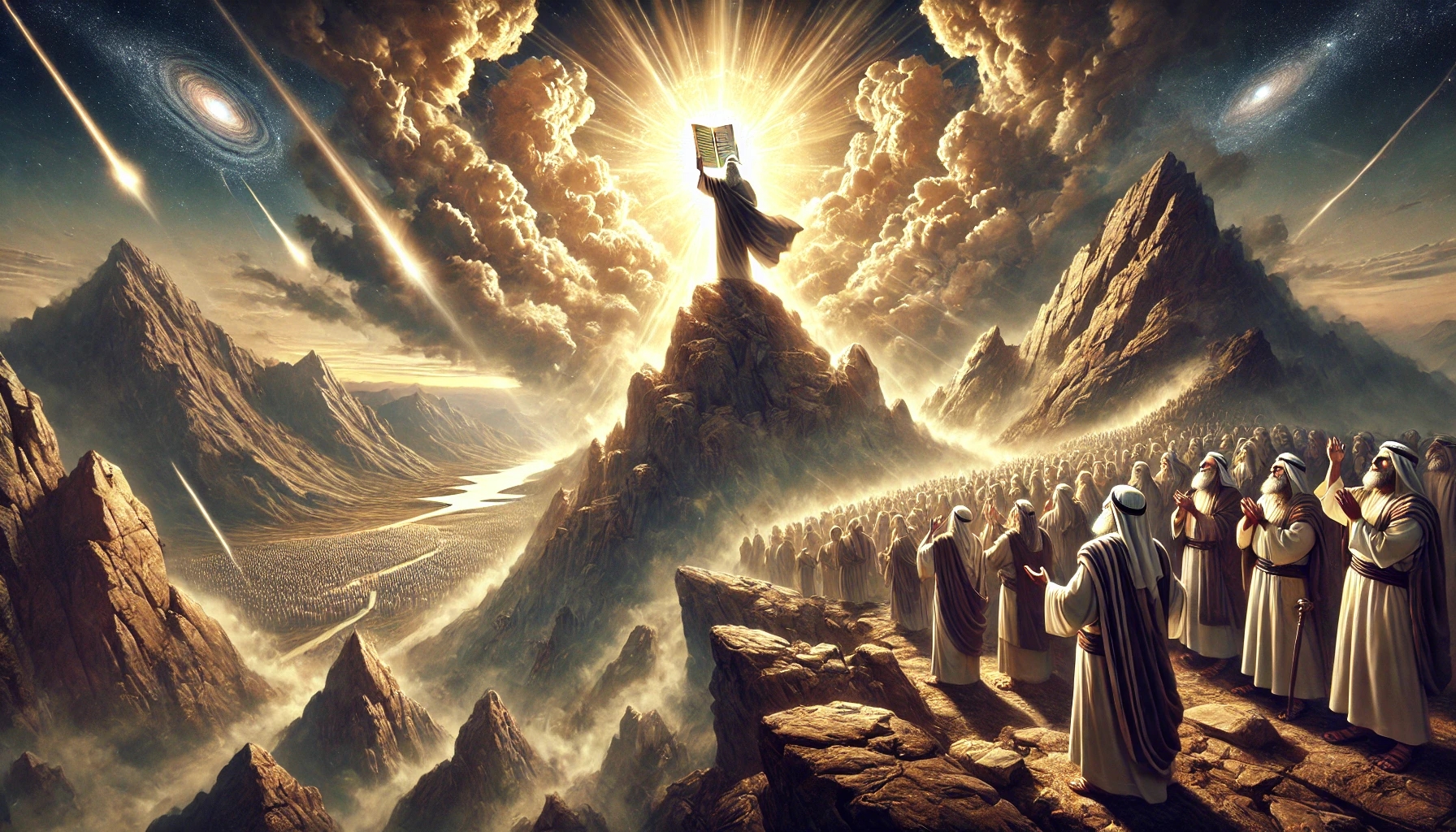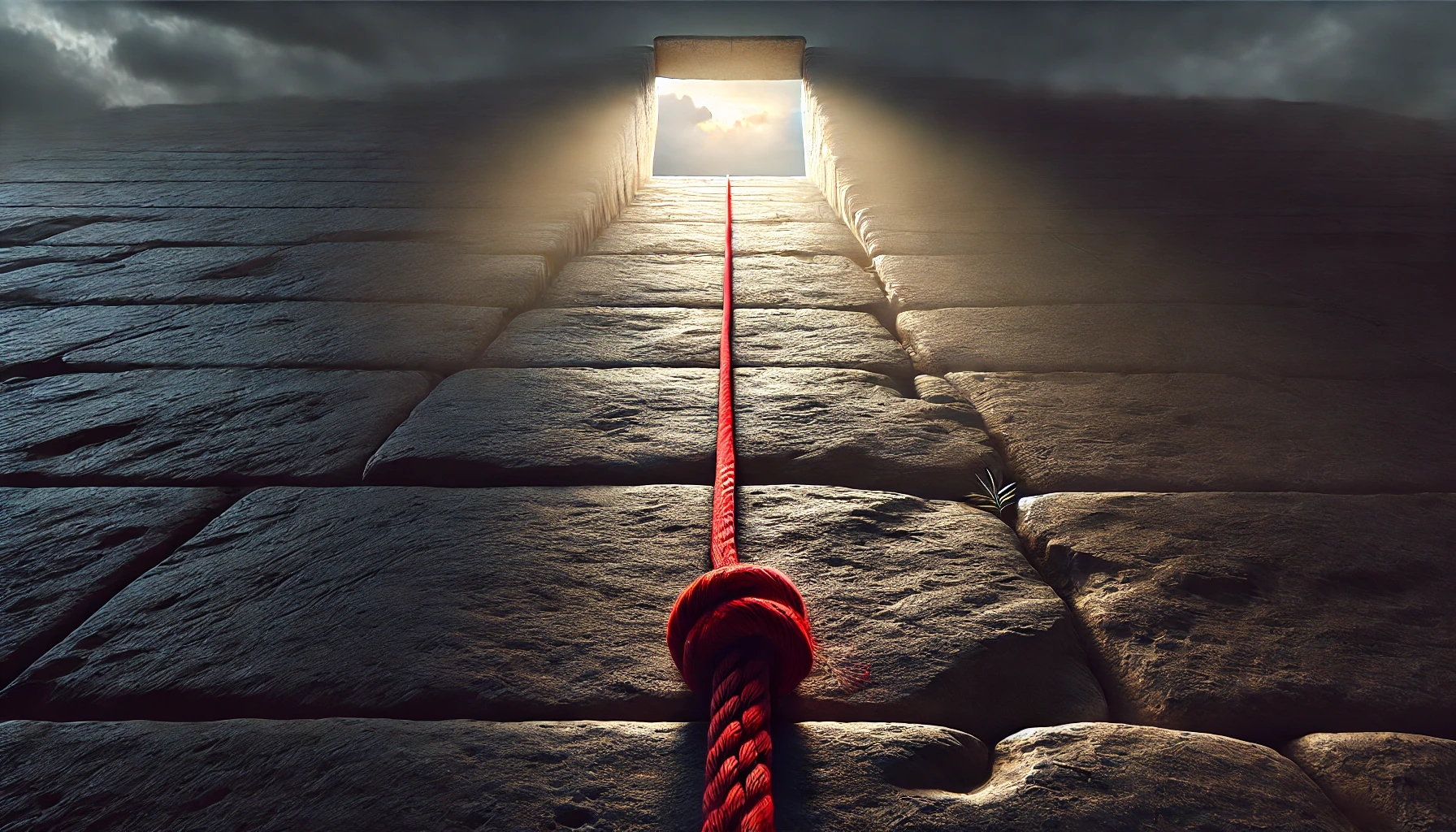
11.10.2025 – 📜 Deuteronomy Chapter 25 – Justice, Responsibility, and Remembrance among God’s People | 📜 BELIEVE HIS PROPHETS
 October 11, 2025
October 11, 2025
 BELIEVE HIS PROPHETS
BELIEVE HIS PROPHETS
 Daily Bible Reading
Daily Bible Reading
 Deuteronomy 25 – Justice, Responsibility, and Remembrance among God’s People
Deuteronomy 25 – Justice, Responsibility, and Remembrance among God’s People
 How God brings order, protection, and truth into the daily life of His people
How God brings order, protection, and truth into the daily life of His people
══════════════════════════════════════════════
 Bible Text – Deuteronomy 25 (KJV)
Bible Text – Deuteronomy 25 (KJV)
1 If there be a controversy between men, and they come unto judgment, that the judges may judge them; then they shall justify the righteous, and condemn the wicked.
2 And it shall be, if the wicked man be worthy to be beaten, that the judge shall cause him to lie down, and to be beaten before his face, according to his fault, by a certain number.
3 Forty stripes he may give him, and not exceed: lest, if he should exceed, and beat him above these with many stripes, then thy brother should seem vile unto thee.
4 Thou shalt not muzzle the ox when he treadeth out the corn.
5 If brethren dwell together, and one of them die, and have no child, the wife of the dead shall not marry without unto a stranger: her husband’s brother shall go in unto her, and take her to him to wife, and perform the duty of an husband’s brother unto her.
6 And it shall be, that the firstborn which she beareth shall succeed in the name of his brother which is dead, that his name be not put out of Israel.
7 And if the man like not to take his brother’s wife, then let his brother’s wife go up to the gate unto the elders, and say, My husband’s brother refuseth to raise up unto his brother a name in Israel, he will not perform the duty of my husband’s brother.
8 Then the elders of his city shall call him, and speak unto him: and if he stand to it, and say, I like not to take her;
9 Then shall his brother’s wife come unto him in the presence of the elders, and loose his shoe from off his foot, and spit in his face, and shall answer and say, So shall it be done unto that man that will not build up his brother’s house.
10 And his name shall be called in Israel, The house of him that hath his shoe loosed.
11 When men strive together one with another, and the wife of the one draweth near for to deliver her husband out of the hand of him that smiteth him, and putteth forth her hand, and taketh him by the secrets:
12 Then thou shalt cut off her hand, thine eye shall not pity her.
13 Thou shalt not have in thy bag divers weights, a great and a small.
14 Thou shalt not have in thine house divers measures, a great and a small.
15 But thou shalt have a perfect and just weight, a perfect and just measure shalt thou have: that thy days may be lengthened in the land which the Lord thy God giveth thee.
16 For all that do such things, and all that do unrighteously, are an abomination unto the Lord thy God.
17 Remember what Amalek did unto thee by the way, when ye were come forth out of Egypt;
18 How he met thee by the way, and smote the hindmost of thee, even all that were feeble behind thee, when thou wast faint and weary; and he feared not God.
19 Therefore it shall be, when the Lord thy God hath given thee rest from all thine enemies round about, in the land which the Lord thy God giveth thee for an inheritance to possess it, that thou shalt blot out the remembrance of Amalek from under heaven; thou shalt not forget it.
══════════════════════════════════════════════
 Introduction
Introduction
Deuteronomy 25 contains a series of diverse laws that regulate Israel’s social and religious life. They concern justice, family responsibility, fair dealings, and historical remembrance. Although varied in content, they share one purpose: justice, reverence for God, and respect for one’s fellow man.
Of special note are the laws of levirate marriage and the prohibition of false weights and measures—both expressions of divine care for family and social integrity.
══════════════════════════════════════════════
 Commentary
Commentary
1. Justice with Restraint (vv. 1–3)
Disputes are to be settled by proper judgment—God values order and fairness.
Even punishment must be measured: no more than forty stripes.
Justice, yes—but not cruelty or excess.
2. Respect for the Working Animal (v. 4)
“You shall not muzzle the ox while it treads out the grain.”
→ A small command with great meaning: respect even for those who serve.
→ In the New Testament, this is applied to preachers (1 Corinthians 9:9–10).
3. Levirate Marriage – Responsibility for the Family Legacy (vv. 5–10)
If a man dies childless, his brother must marry the widow to preserve the family name.
Refusal brings shame—symbolized by removing the sandal and spitting.
A symbolic reminder: family responsibility extends beyond death.
4. Limits in Self-Defense (vv. 11–12)
A harsh law, but intended to preserve dignity and purity—life and offspring are sacred.
5. Honest Weights and Measures (vv. 13–16)
God detests deceit—especially in daily business.
Integrity begins in small things: scales, measures, and accounts.
Justice must reign not only in courts, but in homes and markets.
6. The Amalekites – Memory and Justice (vv. 17–19)
Amalek attacked the weak and weary—God remembers injustice.
Israel must not forget; erasing Amalek’s name was a moral act, not revenge.
══════════════════════════════════════════════
 Summary
Summary
This chapter shows how God shapes a just and responsible society through:
-
Measured justice
-
Protection of the weak
-
Honest labor
-
Family responsibility
-
Integrity in trade
-
Historical remembrance
In private, business, or community life, God’s standard remains: just, pure, merciful.
══════════════════════════════════════════════
 Message for Us Today
Message for Us Today
- God cares not only for our prayers but also for our everyday choices.
- Honesty in small things is true worship.
- We bear responsibility for others—especially in our families.
- God does not forget wrongdoing, yet He calls us to practice justice.
- The past must not be forgotten—it teaches truth, faithfulness, and justice.
══════════════════════════════════════════════
 Reflection Questions
Reflection Questions
-
Where might I act with “two weights”—in judgment, forgiveness, or criticism?
-
How do I handle my responsibilities in family or work—faithfully or conveniently?
-
What does it mean for me to live out God’s justice today, even when no one is watching?
~~~~~ ~~~~~
~~~~~

 October 5–11, 2025
October 5–11, 2025
 BELIEVE HIS PROPHETS
BELIEVE HIS PROPHETS
 Weekly Reading from the Spirit of Prophecy
Weekly Reading from the Spirit of Prophecy
 Ellen White | Patriarchs and Prophets – Chapter 31
Ellen White | Patriarchs and Prophets – Chapter 31
 The Sin of Nadab and Abihu
The Sin of Nadab and Abihu
 Read online here
Read online here
 Introduction
Introduction
The service of the sanctuary was no ordinary task. God Himself established every detail—from the sacrifices to the priestly duties.
The story of Nadab and Abihu, Aaron’s sons, dramatically shows what happens when God’s clear instructions are ignored—even with good intentions.
Their death was not only judgment, but a lasting warning to all who draw near to God.
Key Scriptures:
- Leviticus 10:1–3 – The sin of Nadab and Abihu
- 1 Peter 2:9 – “You are a chosen generation, a royal priesthood…”
- 1 Corinthians 3:17 – “You are God’s temple.”
- Proverbs 14:12 – “There is a way that seems right to a man…”
══════════════════════════════════════════════
 Commentary
Commentary
1. The Call to Holy Service
After the dedication of the tabernacle, fire from heaven consumed the offering—a sign of divine approval.
Lesson: What God sanctifies must remain holy—without exception.
2. The Sin of Nadab and Abihu
Despite their high privilege, they disobeyed God by offering “strange fire.”
They acted willfully, not in obedience.
Likely influenced by wine and carelessness, they disregarded divine order.
3. The Seriousness of God’s Standard
No rank or relationship shields from consequence.
“I will be sanctified in those who draw near to Me.” (Leviticus 10:3)
4. Parental Responsibility
Aaron’s leniency and lack of discipline indirectly contributed to the tragedy.
Parents shape the spiritual lives of their children—love must be paired with accountability.
5. Warning Against Self-Deception
Spiritual privilege does not exempt from obedience.
Religious experience cannot replace daily faithfulness.
6. The Danger of Intoxication
Their minds were clouded—physically and spiritually.
Those who serve must remain clear-minded and pure (1 Corinthians 6:19–20).
7. The Spiritual Priesthood Today
As believers, we are all called to priestly service (1 Peter 2:9).
The same reverence and care for the holy still apply.
══════════════════════════════════════════════
 Summary
Summary
-
Holiness is obedience, not emotion.
-
Self-willed service brings destruction.
-
Intoxication—by pride or indulgence—destroys discernment.
-
Parents bear sacred responsibility for their children’s faith.
-
God’s holiness demands respect for what He calls sacred.
══════════════════════════════════════════════
 Message for Us Today
Message for Us Today
God’s standard for us is not lower than for Nadab and Abihu—it is higher. Greater light brings greater responsibility. Yet He provides all grace needed to live in purity and obedience. Our service is holy—not mechanical. God calls us to reverence, sobriety, and dedication.
══════════════════════════════════════════════
 Reflection Question
Reflection Question
“Do I live my faith with holy reverence—or with routine?
Where do I need greater spiritual clarity to distinguish between the holy and the common?”
~~~~~ ~~~~~
~~~~~

 October 5–11, 2025
October 5–11, 2025
 BELIEVE HIS PROPHETS
BELIEVE HIS PROPHETS
 Weekly Reading from the Spirit of Prophecy
Weekly Reading from the Spirit of Prophecy
 Ellen White | Patriarchs and Prophets – Chapter 32
Ellen White | Patriarchs and Prophets – Chapter 32
 The Law and the Covenants
The Law and the Covenants
 Read online here
Read online here
 Introduction
Introduction
Many Christians ask: Does God’s law still apply? Is the Old Testament outdated?
What role do the law, sacrifices, and covenants play in the plan of redemption?
This chapter provides a deep, biblical answer: God’s law is no relic—it is the foundation of His government, the expression of His love, and the mirror of His character.
The covenants with Adam, Abraham, Israel, and through Christ are stages of one continuous plan of salvation.
══════════════════════════════════════════════
 Commentary
Commentary
1. God’s Law: Unchanging Since Eden
Adam and Eve knew God’s law—it was written in their hearts.
After sin, the law remained; sacrifices pointed to the coming Redeemer.
The law revealed sin but was never its cause.
Key verse: Genesis 26:5 – Abraham obeyed God’s “commandments, statutes, and laws.”
2. Two Laws: Moral and Ceremonial
-
Moral Law: The Ten Commandments—written by God’s own hand, eternal and universal.
-
Ceremonial Law: Sacrificial and ritual ordinances—temporary, pointing to Christ.
Christ fulfilled, not abolished, the ceremonial symbols (Colossians 2:14).
Matthew 5:17–18 – “I came not to destroy, but to fulfill.”
3. Two Covenants: Old and New
-
Old Covenant: Based on human promises—“All that the Lord has said we will do.”
-
New Covenant: Based on divine grace—law written in the heart (Jeremiah 31:33).
The New Covenant does not abolish the law but enables obedience through transformation.
Romans 3:31 – “Do we then make void the law through faith? Certainly not!”
4. Christ – Center of Law and Covenant
Jesus, before His incarnation, was the Lawgiver at Sinai and the Redeemer of Israel.
In the New Testament, He reveals the same principles—lived in perfect love.
The gospel brings light to the same eternal truths.
2 Corinthians 5:19 – “God was in Christ, reconciling the world to Himself.”
5. Israel as Light to the Nations
God’s intent: a people reflecting His love through obedience.
Israel failed through pride and idolatry.
Today, God’s people are called to be that light (Matthew 5:14–16).
══════════════════════════════════════════════
 Summary
Summary
-
God’s law is eternal, holy, and unchangeable.
-
The ceremonial law was temporary and fulfilled in Christ.
-
The Old Covenant revealed the need for grace; the New Covenant writes the law on the heart.
-
Christ is the center of all law and covenant.
-
God’s people today are to embody His principles before the world.
══════════════════════════════════════════════
 Message for Us Today
Message for Us Today
God’s plan has never changed. His commandments are not a burden but a path of life. The New Covenant is not license for lawlessness but an invitation to inner renewal. In Christ, we are not lawless—but lawful, because His Spirit writes His law within us. The world needs people who live God’s will out of love, not duty. Obedience of faith is the mark of God’s true people.
══════════════════════════════════════════════
 Reflection Question
Reflection Question
“Do I carry God’s law on tablets of stone—or in my heart?
Do I live by my own strength—or by the power of the New Covenant?”
══════════════════════════════════════════════
LuxVerbi | The light of the Word. The clarity of faith.
🌍 Adventist News Network – October 10, 2025: School in Ukraine Grows Amid War & More Global News
 Adventist News Network – October 10, 2025: School in Ukraine Grows Amid War & More Global News |
Adventist News Network – October 10, 2025: School in Ukraine Grows Amid War & More Global News |
This week on ANN: |
· An Adventist school continues to grow, even in the midst of conflict in Ukraine.
· Congress awards the Adventist Church its highest national honor in Colombia, and a father and daughter race together, turning challenges into victories in Brazil.
· Plus, students keep studying in temporary classrooms, six years after a flood in Indonesia, and ADRA brings relief to today’s most urgent humanitarian crises around the world.
· Stay tuned as ANN brings everything you have to know about what is happening in the church worldwide.
Lessons of Faith from Joshua – Lesson 2.Surprised by Grace | 📘 Sabbath School with Pastor Mark Finley

Series LESSONS OF FAITH FROM JOSHUA with Pastor Mark Finley
Lesson 2.Surprised by Grace
God Often Works Through the Unexpected
In this lesson, we meet people who, at first glance, do not seem to belong to God’s people—Rahab, a pagan prostitute, and the cunning Gibeonites. Yet they experience grace and salvation because they recognize God’s power and turn to Him. Their stories challenge our assumptions about who is “worthy” to belong to God’s people. At the same time, they show that God’s mercy is greater than origin, past, or deceit. These narratives remind us that faith, courage, and repentance can flourish in the most surprising places—when God’s grace is at work.
Content:
2.1 Second Chance
God’s Grace in Places of Former Failure
Despite the tragic background in Shittim, Joshua begins his mission right there—at a place once marked by disobedience. Unlike the generation in Numbers 13, Joshua now trusts in God’s guidance and sends out two, not twelve, spies. This deliberate decision shows that trust can grow—even after failure. The parallel to Peter is striking: like Israel, he is given another opportunity to be faithful, though he once failed. God is the God of second chances—not because we deserve them, but because His grace is greater than our failure. This biblical truth should shape our own behavior: not holding people captive to their past mistakes, but opening paths toward restoration.
2.2 Value in Unexpected Places
Faith Blossoms Even in a Dark Environment
Rahab was a woman of questionable reputation in a profoundly godless society—yet she recognized who the true God is. Her courageous act of protecting the spies expressed a growing faith, not moral perfection. Although her lie is not justified, Scripture praises her faith and her decision to join God’s people. On the roof of her house, Rahab declared that the Lord is God over heaven and earth—a powerful confession from an unexpected mouth. Her story shows that God’s grace finds faith where it is least expected. It reminds us that true loyalty to God often begins with courageous choices that go against the cultural current.
2.3 New Allegiance
A Red Cord That Brings Salvation
Rahab’s plea for protection for herself and her family strongly recalls the Passover in Egypt, when blood on the doorposts was the sign of salvation. Likewise, the red cord in her window becomes the sign of deliverance during Jericho’s destruction. Rahab shows not only faith but covenantal loyalty (chesed)—a deep trust in the God of Israel, to whom she freely aligns herself. Although as a Canaanite she was under the ban, by faith she became part of God’s people. As with Passover, faith and obedience belong together—the saving covenant demands a visible response. The gospel in this story is clear: salvation comes by grace but becomes visible through lived faith.
2.4 Conflicting Values
When Grace and Truth Meet
The stories of Rahab and the Gibeonites present two responses to God’s power—both seek salvation, but in different ways. While Rahab openly confesses her faith in the God of Israel, the Gibeonites choose deception. Yet their goal is similar: they want to live, and they acknowledge God’s work. Still, a moral tension remains: the Israelites make a decision without consulting God, which later leads to ethical conflict. This shows that even well-intentioned choices can be problematic when made apart from divine guidance. The story warns us to seek God’s will first—even in complex situations—because not every “clever” solution is a faithful one.
2.5 Surprising Grace
An Oath That Brings Life Instead of Death
Joshua responds to the Gibeonites’ deception not with revenge but with a balanced combination of justice and mercy. Though the covenant was made through deceit, Israel keeps the oath—out of respect for the name of God in which it was sworn. Instead of destroying the Gibeonites, Joshua appoints them as servants in the sanctuary, giving them a place in Israel’s worship. This shift from judgment to grace shows that God honors genuine submission more than background or past. The story reminds us that God’s grace often takes surprising paths—and even deceit, when accompanied by reverence and repentance, can lead to blessing. Joshua’s handling of the Gibeonites teaches us that true loyalty to God also means wisely combining forgiveness with responsibility.
2.6 Summary
When Faith Grows Where You Least Expect It
Lesson 2 shows that God’s grace can work even in places marked by failure, deceit, or sin. Rahab and the Gibeonites come from nations under God’s judgment, yet through faith and the decision to submit to Him, they find inclusion among His people. These stories demonstrate that true loyalty to God is not about perfection but about a deliberate turning toward Him. Joshua’s dealings with these people combine justice with mercy and reveal that God’s covenant is open even to outsiders. The message is clear: God’s grace surprises—it finds people where we least expect it and gives them a place in His plan. In doing so, our own hearts are challenged to remain open to God’s work beyond our expectations.
🌍 Adventist News Network – October 3, 2025: ADRA’s Humanitarian Response in South Asia & More Global News
 Adventist News Network – October 3, 2025: ADRA’s Humanitarian Response in South Asia & More Global News |
Adventist News Network – October 3, 2025: ADRA’s Humanitarian Response in South Asia & More Global News |
This week on ANN: |
· Earthquakes and floods place South Asia on high alert, prompting ADRA’s humanitarian response across three countries.
· In Australia, Adventist teachers cycle nationwide to raise awareness about suicide prevention.
· In Colombia, television evangelism reaches thousands and earns national recognition, while an award-winning short film highlights the creative excellence of an Adventist university in the United States. Plus, amid war in Ukraine, a young man finds hope through TikTok and chooses to follow Jesus.
· Stay tuned as ANN brings everything you have to know about what is happening in the church worldwide.
- « Previous Page
- 1
- …
- 16
- 17
- 18
- 19
- 20
- …
- 704
- Next Page »
